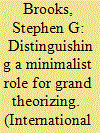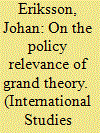| Srl | Item |
| 1 |
ID:
152340


|
|
|
|
|
| Summary/Abstract |
A major theoretical shortcoming in international relations (IR) is the lack of any semblance of a common understanding regarding the role of grand theory. This article argues that explicit theoretical work of this sort is useful, but that a search for a single overarching grand theory to guide inquiry is misguided and that the primary business of IR is to form and evaluate middle-range theories.
|
|
|
|
|
|
|
|
|
|
|
|
|
|
|
|
| 2 |
ID:
130925


|
|
|
|
|
| Publication |
2014.
|
| Summary/Abstract |
This paper challenges the commonly held perception that grand theory is irrelevant for policy. Policy, it is often argued, is in need of detailed case-oriented empirical analysis and instrumental policy recommendations rather than any sweeping generalizations or lofty ideas emanating from grand theory. Notwithstanding, this paper argues that grand theory has an underestimated relevance for policy. To be able to see and appreciate this, the notion of policy relevance must be expanded. Whereas grand theory and grand concepts such as Realism, Liberalism, Constructivism, or Marxism do not provide case-specific knowledge or recommendations, they provide general roadmaps, conceptualization of world affairs, and also have a symbolic function, legitimating or challenging established policy paradigms. Policymakers, akin to grand theorists, arguably like to make sweeping statements and generalizations. Drawing on theory and findings in public policy studies, here applied to international relations and foreign policy, this paper suggests conditions under which grand theory can be relevant for policy.
|
|
|
|
|
|
|
|
|
|
|
|
|
|
|
|
| 3 |
ID:
117459


|
|
|
|
|
| Publication |
2012.
|
| Summary/Abstract |
How to theorise religion in International Relations (IR)? Does the concept of post-secularity advance the debate on religion beyond the 'return of religion' and the crisis of secular reason? This article argues that the post-secular remains trapped in the logic of secularism. First, a new account is provided of the 'secularist bias' that characterises mainstream IR theory: (a) defining religion in either essentialist or epiphenomenal terms; (b) positing a series of 'antagonistic binary opposites' such as the secular versus the religious; and (c) de-sacralising and re-sacralising the public square. The article then analyses post-secularity, showing that it subordinates faith under secular reason and sacralises the 'other' by elevating difference into the sole transcendental term. Theorists of the post-secular such as Jürgen Habermas or William Connolly also equate secular modernity with metaphysical universalism, which they seek to replace with post-metaphysical pluralism. In contrast, the alternative that this article outlines is an international theory that develops the Christian realism of the English School in the direction of a metaphysical-political realism. Such a realism binds together reason with faith and envisions a 'corporate' association of peoples and nations beyond the secularist settlement of Westphalia that is centred on national states and transnational markets. By linking immanent values to transcendent principles, this approach can rethink religion in international affairs and help revive grand theory in IR.
|
|
|
|
|
|
|
|
|
|
|
|
|
|
|
|
| 4 |
ID:
095320


|
|
|
|
|
| Publication |
2010.
|
| Summary/Abstract |
I advance an endogenous explanation for the systemic transformation of international politics and offer to neatly resolve the debate between offensive realism and defensive realism through a social evolutionary approach. I contend that international politics has always been an evolutionary system and it has evolved from an offensive realism world to a defensive realism world. Consequently, offensive realism and defensive realism are appropriate grand theories of international politics for two different historical epochs. Different grand theories of international politics are for different epochs of international politics, and different epochs of international politics actually need different theories of international politics. Because international politics has always been an evolutionary system, non-evolutionary approaches will be intrinsically incapable of shedding light on the evolution of the system. The science of international politics must be a genuine evolutionary science and students of international politics must 'give Darwin his due'.
|
|
|
|
|
|
|
|
|
|
|
|
|
|
|
|